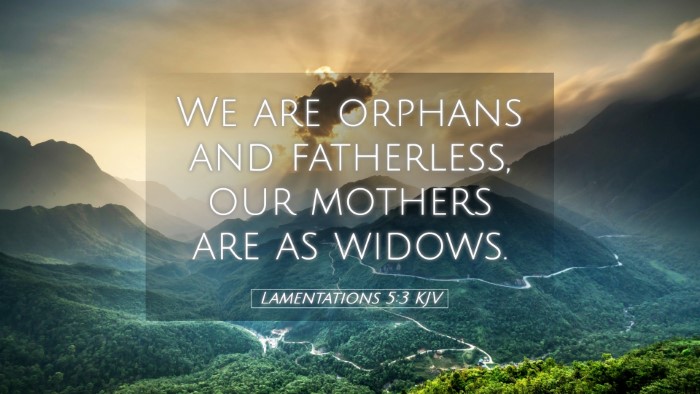Lamentations 5:3 Commentary
Verse Context: Lamentations 5:3 states, "We are orphans and fatherless; our mothers are as widows." This verse is a poignant expression of the grief and desolation faced by the people of Israel after the destruction of Jerusalem. This commentary aims to explore the theological and pastoral implications of this verse through the insights provided by esteemed public domain commentators.
Exegesis of Lamentations 5:3
The lament of the people is a cry for justice and a recognition of their dire circumstances. The verse encapsulates a sense of abandonment and loss, reflecting both spiritual and physical devastation. The use of parental imagery emphasizes vulnerability and the feeling of being forsaken.
Matthew Henry's Insights
Human Vulnerability: Matthew Henry emphasizes the dire human condition expressed in this verse. The status of being "orphans" and "fatherless" signifies not only the loss of family but also a lack of divine protection and guidance. Henry notes that the absence of parents in one's life leads to a feeling of insecurity and helplessness.
Spiritual Abandonment: Henry highlights that Israel’s lament is not only about physical loss but also about spiritual alienation. Just as children rely on their parents for nurture, so too do God’s people rely on Him for their spiritual well-being. This verse signifies that without God’s presence, they are left to navigate life alone, much like abandoned children.
Albert Barnes' Observations
Albert Barnes elaborates on the implications of the imagery used in the verse:
- Symbol of Desolation: Barnes points out that being "fatherless" and having mothers who are "as widows" symbolizes utter desolation. The society that once thrived is now in ruins, reflective of the judgment and consequences faced due to sin.
- Loss of Community: The loss of parental figures denotes a breakdown of community structures. In ancient Israel, the family unit was central to life; thus, their loss represents a broader societal collapse.
- Expectations of Relief: Barnes encourages readers to recognize the weight of their plea for divine intervention, illustrating Israel’s expectations. They long for God’s restoration as a father would protect and provide for his children.
Adam Clarke's Commentary
Adam Clarke provides further depth by focusing on the emotional and theological significances embedded in this verse:
- Recognition of Loss: Clarke asserts that acknowledging their status as orphans indicates a profound sense of loss and need for restoration. The acknowledgment of their condition is a crucial step toward understanding the fullness of their plight and the need for divine assistance.
- The Call to Repentance: He insists that while the lamentation speaks of suffering, it also serves as a reminder of the need for genuine repentance. Recognition of their state of abandonment propels the people towards seeking God's mercy and forgiveness.
Theological Implications
This verse, echoing through centuries, invites modern readers—whether pastors, students, theologians, or scholars—to reflect deeply on themes of abandonment, community, and divine providence.
- Discipleship and Dependency: The imagery of being orphans can compel modern believers to evaluate their discipleship. In what ways do they rely on God as their Father? This verse reinforces that dependency on God is essential for spiritual vitality.
- Community Responsibility: The loss of parental figures also challenges the church to consider its role in fostering connections and providing support for the vulnerable in society. How can the church embody the family of God to those who feel lost and alone?
Pastoral Application
The lamentation in Lamentations 5:3 provides powerful pastoral insights:
- Empathy for Suffering: Pastors can draw from this verse to enhance their empathy towards those experiencing loss, whether through death, divorce, or abandonment. The emotional weight of grief should not be underestimated, and this scripture serves to validate those feelings.
- Encouragement to Seek God: In sermons and teachings, this verse can be used as a call to the congregation, encouraging them to seek God, especially in times of despair. It underscores the importance of turning to God for comfort, healing, and restoration.
- Restoration Message: Lastly, the message of restoration is paramount. The lamentation serves not only as a reminder of their suffering but also as a hopeful plea towards God who, despite their abandonment, can restore and redeem. Pastoral counseling can leverage this message to bring hope to those who feel hopeless.
Conclusion
Lamentations 5:3 encapsulates deep human emotions reflective of despair, loss, and a longing for belonging. Through the insights from Henry, Barnes, and Clarke, we gain a multidimensional understanding of this verse. It serves as a poignant reminder of our need for divine intervention, the importance of community, and the continual call to repentance and restoration. Each believer is encouraged to see themselves not just as orphans in a lost world but as beloved children of God who can depend on Him for every need.


